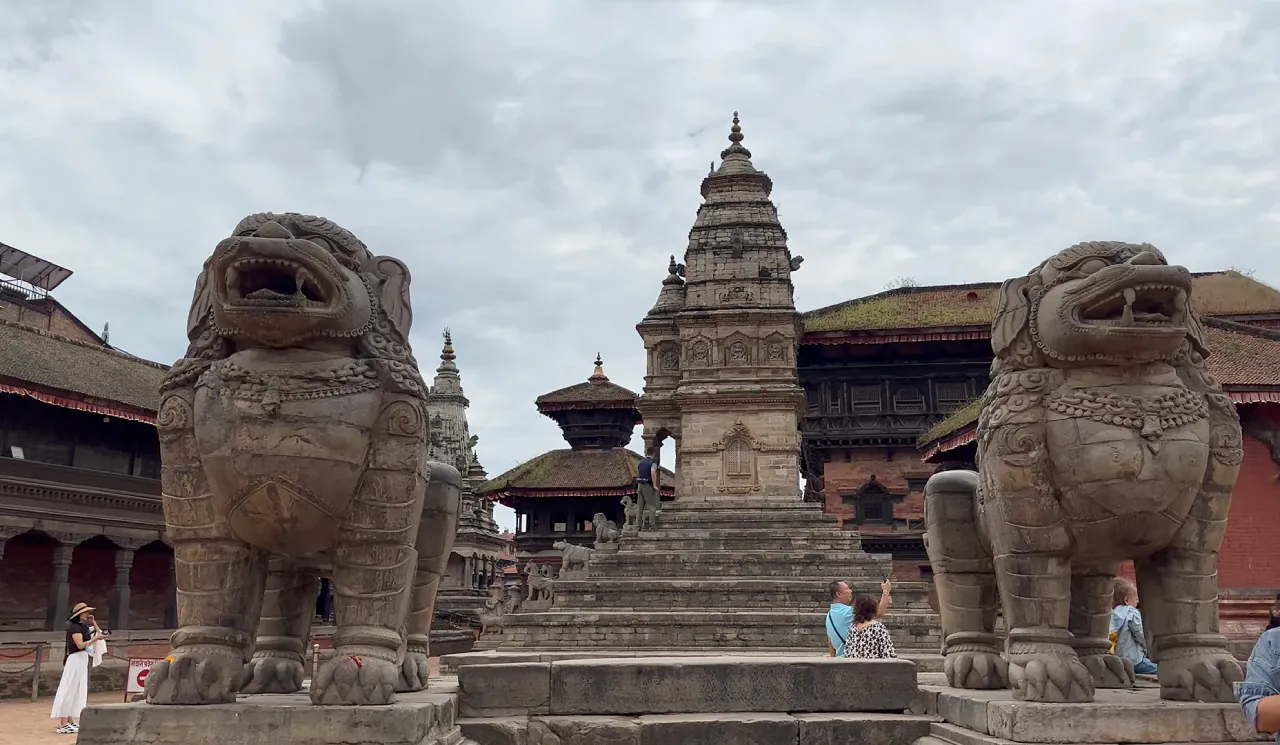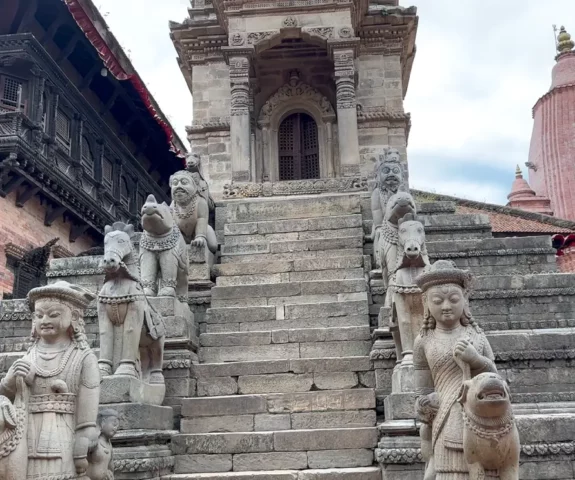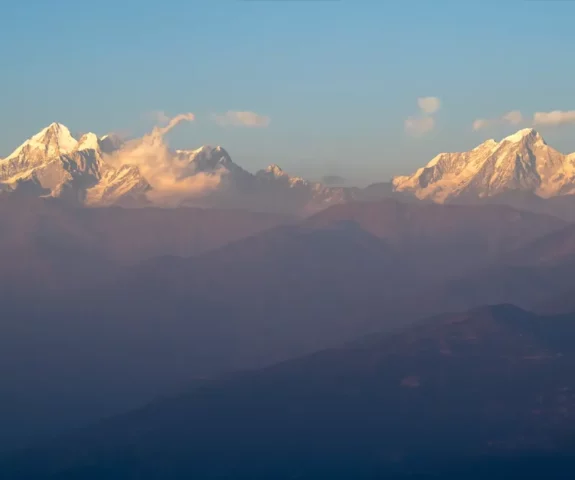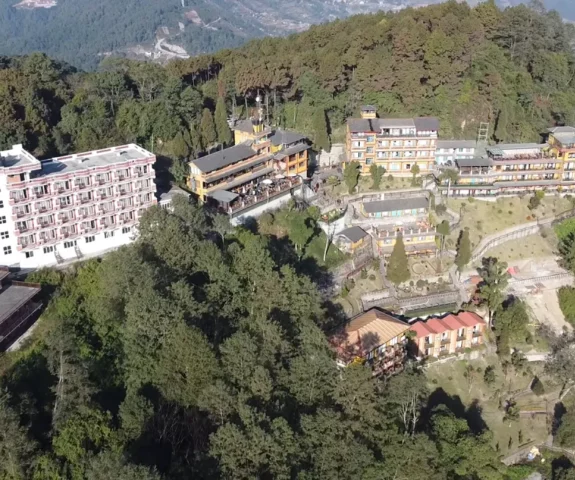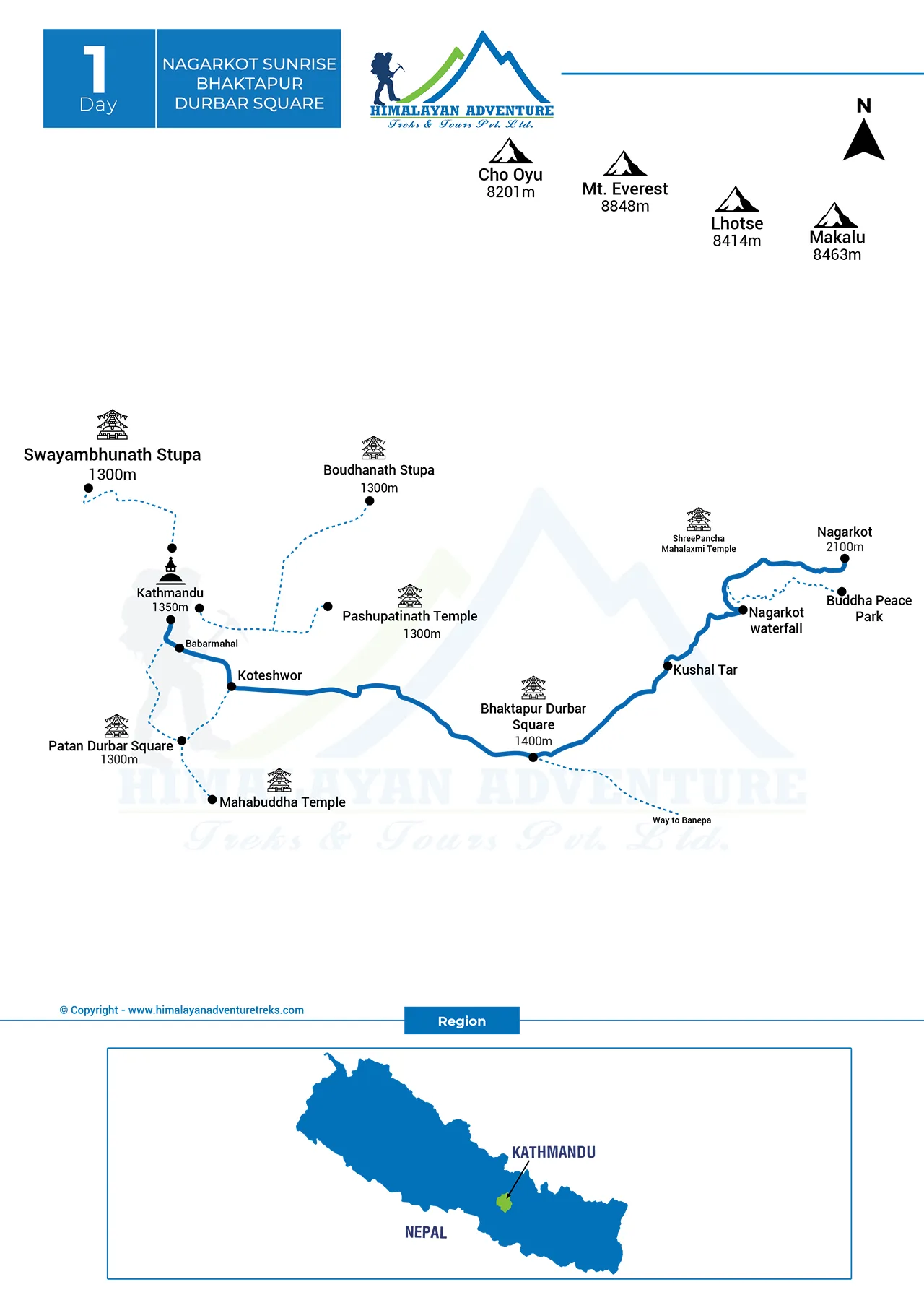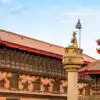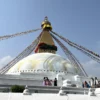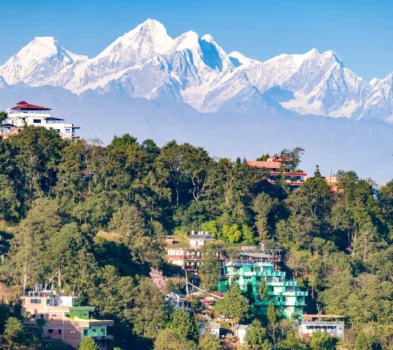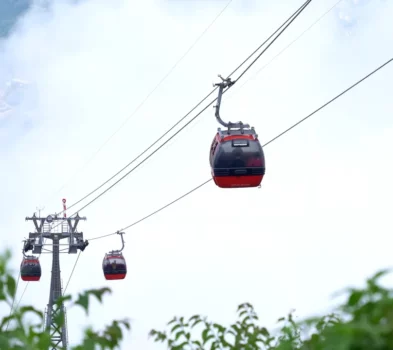Duration
6-7 hours
Private Tour to Nagarkot Sunrise Bhaktapur Durbar Square
Trip Grade
EasyGroup Size
1-16 PeopleMax Altitude
2,175m. / 7,136ft.Best Season
Feb- May/ Sept- NovActivity
Day TourTransportation
Private VehicleTrip Customization
On request (click here)Highlights of Private Tour to Nagarkot Sunrise Bhaktapur Durbar Square
- Witness spectacular sunrise views above the Himalayas from Nagarkot.
- Enjoy the 1.5-hour dramatic trip to Nagarkot from Kathmandu.
- Dive and indulge in the peaceful atmosphere of Nagarkot.
- Get panoramic views of several mountains – Langtang, Ganesh Himal, Jugal, and Rolwaling.
- Explore Bhaktapur Durbar Square, a UNESCO World Heritage Site.
- Perfect trip for the short-stay travelers and first-time visitors.
- Get an insight into Newari art, culture, & architectures.
- Admire the architectural structures – Nyatapola Temple, the 55 Windows Palace, and Vatsala Temple.
- Experience the traditional Newari dishes and local specialty – Juju Dhau (King Curd).
Trip Introduction
A Private tour to Nagarkot Sunrise Bhaktapur Durbar Square exploration is a perfect blend of scenic natural beauty and cultural heritage, offering travelers amazing and unforgettable memories.
Nagarkot is a popular hill station and viewpoint, approximately 30-32 kilometers away from the Kathmandu Valley. From here, you get majestic views of several mountain ranges.
This journey is perfect for travelers seeking for the majestic vistas of mountains along with the rich culture, traditions and history of Bhaktapur Durbar Square, in all single day.
Nagarkot is a serene hilltop, located to the east of Kathmandu. From this place, you will get the impressive views of several mountain ranges that include: Langtang, Ganesh Himal, Jugal, Rolwaling, and Mount Everest, even on clear days.
Nagarkot is an ideal spot to watch sunrise over the Himalayas. You can enjoy panoramic mountain views in a serene hilltop atmosphere while the sky gradually changes color.
After admiring the beauty and nature of Nagarkot, the tour continues to Bhaktapur Durbar Square – one of the promising UNESCO Heritage Sites in Kathmandu Valley.
The square showcases the rich art, architecture, well-preserved Newari architectural-style, ancient temples, royal places, and alike.
The Newari architecture – the 55 Windows Palace, Nyatapola, Vatsala Temple, Golden Gate, and Museum are the main highlights of the Bhaktapur Durbar Square.
The Private tour to Nagarkot and Sunrise Bhaktapur Durbar Square exploration is a scenic landscape, and cultural insights, making it impeccable for nature lovers, heritage explorers, history enthusiast and avid photographers within a short time.
Outline Itinerary of Private Tour to Nagarkot Sunrise Bhaktapur Durbar Square
Day 01: Private tour to Nagarkot Sunrise Bhaktapur Durbar Square
Our guests sharing their experiences (Photo/Video Gallery)
Detail itinerary of Private Tour to Nagarkot Sunrise Bhaktapur Durbar Square
Day 01: Private tour to Nagarkot Sunrise Bhaktapur Durbar Square
Early Morning – Drive from Kathmandu to Nagarkot
The tour begins early in the morning, around 4.30 AM; your driver will pick you up from the hotel lobby. You will have a scenic drive to the Nagarkot hilltop from Kathmandu.
As we leave the city, you will pass the historic outskirts of Bhaktapur. Along the way, you will be delighted by seeing the traditional villages, terraced fields, and bustling streets.
The cool morning breezes and fresh air refresh your mind while traveling to Nagarkot.
As your vehicle reaches upwards, the atmosphere becomes more serene and scenic.
The 1.5-hour drive to Nagarkot from Kathmandu is an essential part of the journey that prepares you for the breathtaking views of sunrise and mountains.
Sunrise Experience & Himalayan Panorama from Nagarkot
Upon reaching Nagarkot, we will head to the View Tower (2,175 m), the vantage point in the region. The sunrise experience will be the memorable part of the entire tour.
As dawn breaks, slowly and gradually the sky changes color with a warm tone of orange, and you will witness an elegant sunrise above the Himalayas.
On a clear day, you will get the spectacular views of several mountains that include Mt. Manaslu (8,163 m), Ganesh Himal (7,422 m), Jugal Himal (6,966 m), Langtang (7,234 m), and other mountains.
The illuminating sky covered with mist, clouds, and the stunning mountains, making it captivating for the avid photographers and nature lovers.
The sunrise and Himalayan panoramic view from Nagarkot offers an unforgettable and flawless experience to the visitors.
Breakfast Time (optional)
After witnessing the sunrise and the Himalayas, you may enjoy the delectable breakfast at the Nagarkot restaurant and café.
This will be a relaxing time for the visitors. You will enjoy the beautiful views with a warm sip of tea and coffee.
This optional breakfast provides you energy for the day ahead to explore the Bhaktapur Heritage Site.
Drive down to the Bhaktapur Durbar Square
After indulging in the elegant nature, you will head down to the Bhaktapur Durbar Square. We will descend through the terraced farmlands, landscapes, green mountains, and countryside villages along the way.
Upon arriving in Bhaktapur City, you will step into the Bhaktapur Durbar Square – a UNESCO World Heritage Site, showcasing the Nepalese art, architecture, and Newari cultures.
Exploring Bhaktapur Durbar Square
Bhaktapur also known as “Bhadgaon”; it was once served as the capital of the Malla Kingdom from the 14th to 15th century. The place is famous for its traditional art, architecture, courtyards, and ancient temples.
Bhaktapur Durbar Square is the main highlight of Bhaktapur. Walking through the square, you will explore several landmarks:
Nyatapola Temple – It is a five-storey impressive pagoda in Bhaktapur. It was built in the year 1702 AD by King Bhupatindra Malla, dedicated to Goddess Lakshami (the goddess of wealth). It is one of the tallest temples of Nepal and a masterpiece of Newari art & architectures.
Vatsala Temple – Vatsala Temple is another iconic landmark of the Bhaktapur Durbar Square. This is a Shikhara-style structure dedicated to the goddess Vatsala.
55 Windows Palace – The 55 Windows Palace is another promising site of the Bhaktapur Durbar Square. It was built in the 15th century by King Yakshindra Malla. It is well known for its fifty-five intricately carved wooden windows.
Aside from these prominent landmarks, you will explore other iconic sites, including the Lion Gate, the Statue of King Bhupatindra Malla, and the Golden Gate.
The Bhaktapur Square offering great opportunity for photographers and cultural researchers. The blend of history, art, and religion is worth exploring.
Lunch and Shopping
After exploring Bhaktapur Durbar Square, it is time to relax and enjoy delectable food at a local restaurant or café in Bhaktapur. You may also enjoy the lunch at the rooftop restaurant overlooking the Bhaktapur Dubar Square. There are several cafes that offer spectacular views of temples and courtyards.
While soaking in the historical ambiance of Bhaktapur, you may try savory dishes includes: Ju:Ju Dhau (King Curd), Newari Khaja/Khana Set, Thakali, Chatmara, Bara, Sekuwa, Choila, and more.

Activity: 6-7 hours

Max. Altitude: 2,175m/7,136ft. Nagarkot, Bhaktapur
Note:
If you have your own private group and want to make your trip private, we can run the custom trip all the day as per your requirements and group size.
Includes and Excludes
What are included with package?
- Fuel surcharge with Driver: This fee covers the cost of fuel used during the tour. It ensures that the vehicle can operate smoothly throughout the trip, and is usually a separate charge added on top of the base tour cost.
- Experience and helpful tour guide: This refers to the guide who will accompany you during the tour. They are knowledgeable about the destination and will provide helpful information, ensuring a more enjoyable and informative experience.
- Entrance fee: The fee required to access specific attractions or sites during the tour. This could include cultural sites, museums, parks, or monuments, and is usually covered separately from the tour cost.
- Hotel pickup and drop-off: This service ensures that the tour company will pick you up from your hotel at the beginning of the tour and drop you back off at the end. It eliminates the need for additional transportation arrangements.
- Transport by private vehicle: The tour will provide a private vehicle for transportation, ensuring comfort, convenience, and flexibility throughout the trip. The vehicle is dedicated to your group, so you can travel at your own pace.
What are not included with package?
- Food and drinks: This refers to the meals and beverages that are not included in the tour package.
Pick Your Suitable Date
Book a Private Trip
Private & Group Discount Price
-
1 -
1 person
US$ 300
-
2 -
2 people
US$ 225
-
3 -
5 people
US$ 200
-
6 -
10 people
US$ 175
-
11 + people
9999
US$ 150
Total Cost:
US$ 300
Route Map & Altitude Chart
Kathmandu Hotel
Start/End point
Kathmandu Hotel
Trip Information
Trip Expectations
- Enjoy a scenic drive to Nagarkot through rural villages, hills, and landscapes.
- A relaxing and rewarding trip
- Get breathtaking sunrise views and enjoy stunning Himalayan views on clear days.
- Mornings in Nagarkot can be chilly, especially in the winter season.
- You will get a chance to explore the historic UNESCO sites of Nepal- Bhaktapur Durbar Square.
- Learn the culture, customs, and traditions of the Newari people.
- It is an ideal trip for families, children, solo travelers, couples, honeymooners, cultural enthusiasts, and photographers.
- At the Bhaktapur Durbar Square, admire other incredible sites – Vatsala Temple, Nyatapola Temple, 55 Windows Palace, Historical Museum, and more.
- Excellent photograph opportunities combining the mountains, culture, people & alike.
- Enjoy the local flavors of Bhaktapur – “JuJu Dhau” (King Curd)
- Except for a well-balanced day, comfortable traveling, and a fruitful sightseeing.
- A perfect which is expected to be completed in a single day (10-12 hrs).
Trip Plans & Preparations
You need thoughtful planning & preparation for the Sunrise Nagarkot Trip & UNESCO Bhaktapur Durbar exploration. Here are some significant things you should keep in mind that will give you unforgettable experiences.
- Choose the ideal season – autumn and spring will better compare to monsoon and winter.
- Check the weather forecast before the trip, so you will get the perfect visibility of the mountains.
- Wear warm layers for the early morning tour to Nagarkot and comfortable walking shoes for the Bhaktapur sightseeing.
- Essentials to carry – camera, sunglasses, sunscreen, water bottle, and other personal necessities.
- Stay hydrated throughout the trip.
- Take the tour fullest. Enjoy the delectable meals and buy souvenirs at the Bhaktapur Durbar Square.
- Carry rain coat attire; if you are planning to travel during the monsoon season.
- Carry some cash for snacks, souvenirs and shopping.
- It is an optional accommodation. You may have an overnight stay at Bhaktapur or Nagarkot.
Useful Information about the Trip
Ideal seasons for the journey
The Private Nagarkot Sunrise Bhaktapur Durbar Square can be enjoyed throughout the year. However, choosing the perfect time ensures you have perfect mountain views and a comfortable journey.
Spring (Mar-May) – Spring is an excellent time for the Nagarkot Visit and exploring Bhaktapur Durbar Square. During these three months, the weather is warm and appropriate, perfect for outdoor activities and heritage site exploration.
The hills and forest bloomed with flowers and rhododendrons. The sunrise views are majestic in the spring season. This season is famous among photographers and cultural enthusiasts.
Autumn (Sep-Nov) – Autumn is regarded as another promising season of this tour. As the monsoon ends, the weather becomes clear. The travelers will get perfect views of the mountains from Nagarkot. You will get a chance to explore the Himalayas, such as Ganesh Himal, Jugal, and Langtang.
The temperature is pleasant everywhere – neither too hot nor too cold. However, you will feel colder in the mornings when you are in Nagarkot. In the afternoon, Bhaktapur Durbar Square is worth exploring in the autumn.
You will also get a chance to celebrate the major festivals of Nepal, which include: Dashain (worshipping goddess Durga), and Tihar (festival of lights).
December (Dec-Feb) – Winter is a peaceful time to explore Nagarkot. The season offers cold mornings, especially in Nagarkot. The days will be warmer when you visit Bhaktapur Durbar Square. Warm clothes are essential when you are in Nagarkot.
Monsoon (Mar-May) – The monsoon has its own charm & beauty. In this season, there are fewer tourists compared to spring, autumn, and winter. During this time, there are heavy rain falls which may obscure the panoramic views of Himalayas. You may also disappoint; if you not witness the sunrise due to heavy clouds.
Availability of Food & Meals
During the Nagarkot Sunrise view and Bhaktapur Durbar Square, food is accessible but limited.
Nagarkot
When you are in Nagarkot, travellers can enjoy a hearty and delectable breakfast. It includes pancakes, egg dishes, chatmara, toast, porridge, Mo:Mo (dumplings), noodles, tea, coffee, and fruit juices alike.
There are some rooftop terrace restaurants, offering amazing mountain views while you have breakfast.
Bhaktapur
The area around Bhaktapur is a worthwhile place that offers several exotic restaurants and cafes. Here are some popular options of meals you may try before or after exploring Durbar Square
- Thakali Khana (Rice, Lentils, Veggies, Chicken/Fish/Mutton curry, Spinach)
- Newari Khana Set
- Ju:Ju Dhau (King Curd)
- Bara
- Papadi & Samosa Chat
- Dyakula
- Choila
- Sekuwa
On-the-Go Snacks
You may also carry light snacks to stay energized and active during the early morning tour.
Vegetarian Options
Some restaurants in Bhaktapur also offer vegetarian and gluten-free food to their travelers.
Is Accommodations is necessary during the trip?
Accommodation is not necessary during the Private Nagarkot Sunrise Bhaktapur Durbar Square trip. There are many travelers starting this trip early in the morning, driving to Nagarkot for sunrise, continuing the journey to Bhaktapur for sightseeing, and returning to Kathmandu on the same day.
If you prefer a relaxed pace, choosing an overnight stay will be a great experience for you. An overnight stay in Nagarkot allows travelers to enjoy the serene atmosphere of Nagarkot. You will also get a chance to witness sunset and sunrise, take leisurely walks, and enjoy the majestic views of the mountains from your hotel room balconies.
Similarly, staying in Bhaktapur will offer a great cultural experience to the visitors. Bhaktapur is less crowded compared to Kathmandu. The heritage hotels and guest houses allowed visitors to immerse themselves in the historical charm of the traditional city.
The travellers who have limited time completed their tour without any accommodation services. For those who love photography, cultural experience, and the slow rhythm of travel, an overnight stay at Bhaktapur or Nagarkot may be enjoyed.
Scenic drive to Nagarkot
The Scenic drive to Nagarkot is one of the main highlights of the Private Nagarkot Sunrise Tour and Bhaktapur UNESCO Sites exploration.
It is a popular journey from Kathmandu to Nagarkot, approximately 30-32 kilometers. The drive will take around 1.5 to 2 hours, depending on the traffic.
While driving to Kathmandu, you will get the fantastic views of terraced fields, bustling markets, rural Nepali villages, and traditional Newari architectural style buildings on the outskirts of the valley.
As you approach to Nagarkot, the air becomes cooler and a refreshing natural escape, offering you unforgettable memories.
On clear days at Nagarkot, you will get the majestic views of several mountain ranges.
Visa Information and Entrance Fees
Travelers planning for the Nagarkot Sunrise Tour and Bhaktapur Heritage site exploration; understanding the visa and Entrance fees ensures a reliable and smooth traveling experience.
Visa Information
International visitors need a valid tourist Visa to enter Nepal. Nepal offers an on visa-on-arrival at the Tribhuvan International Airport, Kathmandu.
The visa process is comfortable and suitable for foreigners. To avoid queues, the travellers may fill out the online application before starting their journey. The passport must have a validity of six months while entering in Nepal.
Indian citizens do not need a passport. However, they have to bring the Identification Card.
Permits
No special permits are required for Sunrise Nagarkot Tour and Bhaktapur Durbar Square exploration. Since it is an accessible by road transport the travelers do not need TIM’s card or any special permit passes.
Entrance Fees
During the Bhaktapur Sightseeing, entrance fees are applied. These fees are collected for the conservation and preservation of historic monuments, temples, and courtyards. The entrance fees differ for international visitors, SAARC nationals, and Nepali citizens.
Here are the current standard entrance fees for the Bhaktapur Heritage Site.
- International Citizens – NPR 1800 (13-15 USD)
- SAARC Nationals – NPR 500 (India, Pakistan, Bangladesh, Sri Lanka, Afghanistan, Bhutan, Maldives)
- Chinese Citizens – NPR 500
- Nepalese Citizens – Free of Cost
- Children (below 10) are free from any country.
Relevancy of Travel Insurance
Travel Insurance is not mandatory for the Private Tour to Nagarkot Sunrise Bhaktapur Durbar exploration, especially for a short trip which is close to Kathmandu. However, the international tourist can depend on their reliable travel insurance for a hassle-free journey.
The tour involves an early morning drive to Nagarkot from Kathmandu. You will have a safe and convenient journey while travelling to Nagarkot.
Upon exploring Nagarkot, we will have sightseeing activities at the Bhaktapur Durbar Square. Your reliable insurance makes you safe from unexpected circumstances that include minor & accidental injuries, trip delays, loss of belongings or any other emergency medical needs.
It is better to know what your insurance covers.
- It covers all medical emergencies (hospital bills, medicine cost and alike)
- It compensates all costs if the trip is cancelled due to unforeseen reasons.
- Complete refund if you’re belonging is lost during the trip.
- A peace of mind while you’re travelling.
Is this trip possible for the beginner’s?
Yes, this trip is perfect for beginners and the first time visitors. It is a comfortable nature exploration and sightseeing tour that does not require prior travel experience.
The tour involves road travel, so the visitors don’t need any technical hiking skills. The tour is a perfect retreat for you. The elevation of Nagarkot is 2,195 m. Therefore, there is no chance of altitude sickness. The sunrise viewpoint can be easily reached by vehicle with no physical strain.
This trip is ideal for families, children, and even solo travellers.
With simple preparation and warm and comfortable clothes, your trip will be flawless and unforgettable.
Tips for the first time visitors
For the first-time visitor, the Nagarkot Sunrise tour and Bhaktapur Durbar Heritage exploration is a rewarding trip that offers joyful and unforgettable experiences.
Firstly, the visitors are advised for the early in the morning departure to witness the sunrise at Nagarkot. The weather of Nagarkot in the early morning can be cold in the season, so warm clothes will be better for you. The visitors should check the weather forecast before starting the tour.
It is also advisable to carry sunscreen, wear sunglasses, and a water bottle in your carry bag. You may take a digital camera or a fully charged mobile with good camera quality to capture the stunning views at Nagarkot and Bhaktapur.
You’d better keep your belongings safe in crowded places. Carry some denominations of cash, it is essential for the entrance fees, local delights, and buying souvenir’s and antiques at Bhaktapur.
Respect local culture and traditions. If you visit any temple, remove your shoes before entering it. First ask permission; then only take photographs.
Sometimes traffic and weather may affect your trip; so be patient & persistence.
By following these simple tips, your journey will be cherished and unforgettable.
People, Culture & Festivals
The Kathmandu, Nagarkot, and Bhaktapur region offers a rich cultural experience, marked by ancient traditions and warm hospitality.
These two elegant places are home to a diverse range of caste and people – Newari, Brahmin, Chettri, Tamang, Magar, and others.
While exploring the nature of Nagarkot and the beauty of Bhaktapur Durbar, you will witness the Nepalese people greeting you with “Namaste”. (Join the hands (palm) together) with a cheering smile on their face.
The Nepalese people are admired everywhere for their warm and gracious hospitality. They consider their visitors “Guest is God” (Atithi Devo Bhava)
While exploring these two places, you will find several temples, monasteries, and shrines. The Bhaktapur city reflects the pioneer art & architecture that was built several centuries ago.
Festivals play a vital role in the local Nepalese life. Dashain (worshipping goddess Durga), Dipawali (festival of lights), Holi (festival of color), Indra Jatra, and Bisket Jatra are some major festivals that are celebrated in these two regions. Through these celebrations and festivals, people and the community bring harmony and strengthen bonds.
Language & Communication
Nepal is rich in cultural diversity and hosts a wide variety of languages. Private tour to Nagarkot Sunrise Bhaktapur Durbar Square exploration is easy and convenient for domestic as well as international visitors.
The people reside in Bhaktapur, and sorroundings speak Nepali and the local Newari language. There is no language barrier for the guests and visitors. In the tourist areas like hotels, restaurants, and markets, tourists can easily understand and speak English.
Hiring a professional English guide make your trip wonders & wonders. They have in-depth knowledge of the destinations. In addition, the guide also provides historical context and cultural insights during the tour.
The local people of Nagarkot and Bhaktapur are welcoming and friendly. Even with the language barriers, they are helpful and accompany their guests and customers.
Mobile network and connectivity are excellent in Bhaktapur and Nagarkot. The Local SIM Card NTC/Ncell provides reliable data services and low-priced calls. Furthermore, free Wi-Fi services are available in some public areas, hotels, and restaurants.
Extra Expenses
While booking the Nagarkot Sunrise tour & Bhaktapur UNESCO sites trip includes almost everything that you need during the tour. However, the visitors have to pay some additional expenses that are usually not included in the package.
One common additional expense is the Bhaktapur Heritage Site entrance fee. It varies from SAARC, Nepalese, Foreign and Indian nationals. Similarly, fees for museums and special exhibits need separate charges.
Food and beverages are the other extra costs that have to be paid by the visitors. It will be in the form of breakfast and lunch. At Bhaktapur, you may try local meals such as Ju:Ju Dhau (King Curd) and Newari Dishes.
You have to pay yourself for the local shopping. Bhaktapur is an ideal place to buy traditional handicrafts, handmade jewelry, paper products, pashmina shawls, spices, and paintings.
Tipping is a common practice in Nepal, though it is not mandatory but highly appreciated. You may also donate a small amount to the monasteries and temples.
Trip Extensions
Yes trip extension is possible for the Private tour to Nagarkot Sunrise Bhaktapur Durbar Square, and it is also the popular choice of the visitors.
You can extend your wonderful tour by adding an overnight stay in Nagarkot, which allows you both to witness the spectacular sunrise and sunset views. In addition, you will have an amazing time in the peaceful and serene atmosphere.
Another common extension is spending some more time in Bhaktapur. An overnight stay allows you more time to explore this beautiful city.
The tour can also be extended to explore Changu Narayan Temple, a sacred site dedicated to Lord Vishnu. It is one of the oldest Hindu temples of Nepal, also listed in the UNESCO Heritage Site.
For broader experiences, the travelers may combine this tour to Kathmandu Valley Sightseeing like Patan Durbar Square, Pashupati Nath Temple, Kathmandu Durbar Square, and Buddhist Pilgrimage Tour (Swayambhu Mahachaitya, Boudhanath Temple).
Aside from these heritage sites, you may also extend your trip with an evening exploration in Thamel. After enjoying the nature and sightseeing at Bhaktapur, you may relax in Thamel – a bustling market of Kathmandu.
Photography at Nagarkot and Bhaktapur Durbar Square
Nagarkot is one of the promising destinations for sunrise and landscape photography. Perched on the hilltop, it gives sweeping views of several Himalayan ranges.
The early mornings are the most rewarding time for an avid photographer. On clear days, you will get outstanding pictures of snow-capped peaks on your camera. Even on the cloudy mornings, the dramatic clouds and fog creates atmospheric shots.
Bhaktapur Durbar Square is a photographer paradise. During the sightseeing, you can take pictures of courtyards, temples, architectures. In addition, Nyatapola Temple, 55 Windows Palace, and Pottery Square are the main highlights and attractions for the photographers.
Photography Tips and Regulations
- Visit Nagarkot early for the promising viewpoints.
- Respect local customs while taking any picture.
- Ask permission before photographing people.
- Use a wide-angle lens for the best photography.
- Additional fees or permits are required for additional photography in Bhaktapur.
Frequently Asked Questions
How far is Nagarkot from Kathmandu City?
Nagarkot is approximately 30-32 kilometers away from Kathmandu city. It takes around 1.5 hours to reach via road, depending on the traffic.
Is the sunrise visible every day from Nagarkot?
No, the sunrise isn’t visible every day from Nagarkot due to the clouds and haze. The weather plays a key role; spring and autumn are the perfect times to witness the sunrise.
Is this tour suitable for all age groups?
Yes, this 1-day tour is suitable for families, children, couples, and honeymooners, and even for solo travelers.
Is Bhaktapur Durbar Square a UNESCO World Heritage Site?
Yes, Bhaktapur Durbar Square is a UNESCO World Heritage Site. It is inscribed by the UNESCO in 1979.
Is this a half-day tour or a full-day tour?
The tour ranges from half a day to full-day. It depends on how much time spends on the Bhaktapur Durbar Square and Nagarkot.
Why is a private tour best for the travellers?
The Private Tour offer more flexibility, personalized timing, and comfortable transport to the visitors. It also allows you to the customized the itinerary that makes an ideal tour for every age.
Will I get time for shopping in Bhaktapur?
Absolutely Yes! The Bhaktapur City is a promising place to buy wood carvings, paper products, Nepali spices, bowls, Pashmina shawls, and other products that reflect Newari Craftsmanship.
What are the main highlights of the Bhaktapur Durbar Square?
Vatsala Temple, 55 Windows Palace, Nyatapola Temple, Golden Gate, Statue of King Bhupatindra Malla is the main highlights of the Bhaktapur Durbar Square.
Can I take pictures in Nagarkot and Bhaktapur Durbar Square?
Yes, photography is allowed in Nagarkot and Bhaktapur Durbar Square. However, you ask permission before taking a photograph of any site or local people.
What should I wear during the Nagarkot Tour?
For the Nagarkot tour, you should wear warm layers, comfortable clothes, and a good pair of walking shoes and sun protection while you will be in the Bhaktapur Durbar Square.
What is the best time for the Nagarkot and Bhaktapur Durbar UNESCO Square visit?
The best time is autumn (Sep-Nov), spring (Mar-May). During these seasons, there will be mild weather, clear skies offering majestic views of Himalayas from Nagarkot.
Are there ATM services available in Nagarkot and Bhaktapur Durbar Square?
Yes, both Nagarkot and Bhaktapur Durbar Square has ATM services where you can easily withdraw cashes.

